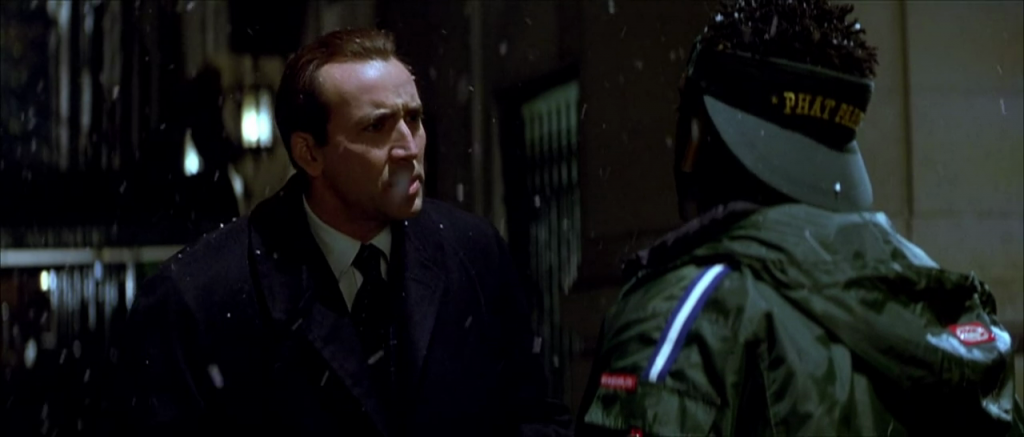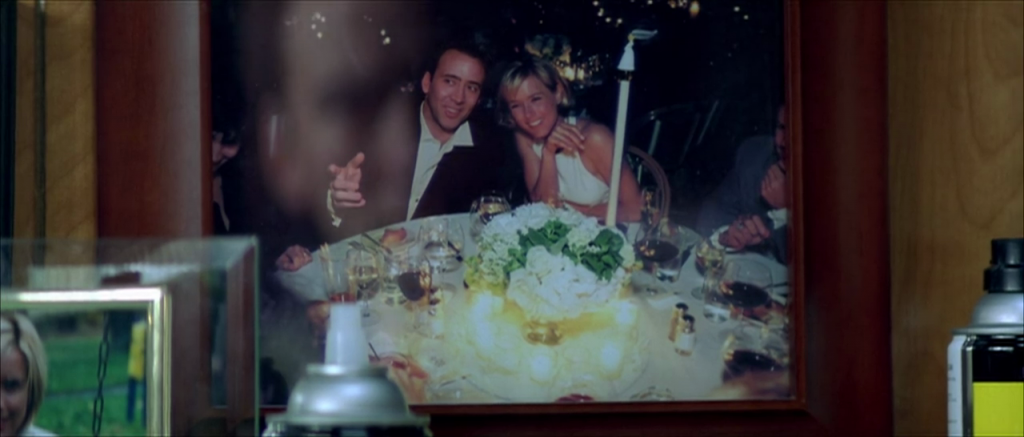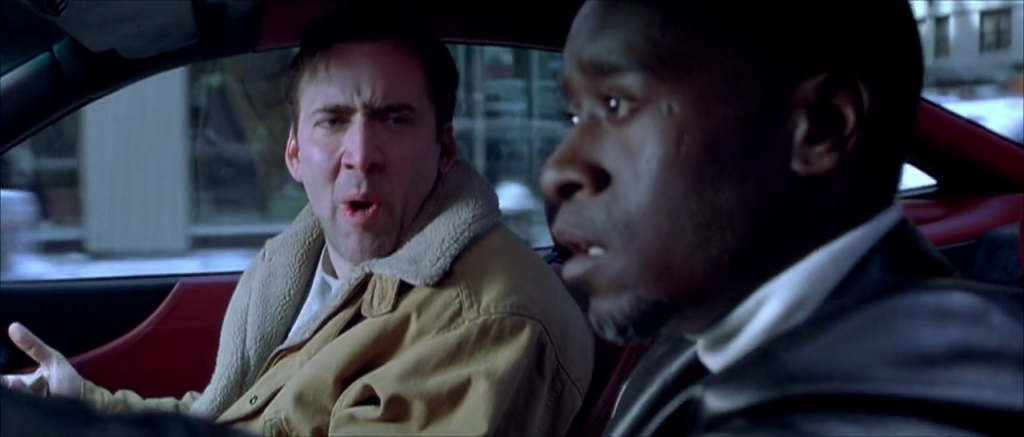There’s a psychological theory that everyone has something called a ‘locus of control’; people with an internal locus of control believe that they are responsible for their own actions, people with an external locus of control believe their actions are guided by external forces, such as fate, or luck. According to various studies, those with an external locus of control are more likely to suffer from depression, are worse at taking care of their health, and tend to have less successful careers and lives generally.
My name is Ed and I watch Nicolas Cage films and use them to pick National Lottery numbers.
Speaking of being influenced by external forces, The Family Man, a sort of inverted version of It’s A Wonderful Life. Instead of finding out what the world would have been like if he never lived, Nicolas Cage finds out what the world would have been like if he’d actually had a life. Cage is investment broker Jack Campbell, who ditched the love of his life when he left the country to pursue his career and is now a High-Powered Single.

There’s no Clarence showing up on the bridge moment here — Jack instead gets his chance when he stops Don Cheadle from robbing a corner shop. The implication is that God sends Don Cheadle to rob corner shops and people who intervene to stop anyone getting hurt are rewarded with second chances. If they don’t intervene I guess God hates people who run corner shops and is fine with a bit of collateral damage, if it proves a point?

So, next morning Jack wakes up to find himself living a ‘normal life’ in suburbia — he’s now a husband, a father, and a tyre salesman. Practically means that a) Nicolas Cage spends a lot of time looking completely astonished at utterly normal things like microwaves and that b) everyone else spends a lot of time looking at Nicolas Cage as though he’s lost his mind, which is basically the ideal mode for a Nicolas Cage movie.
Of course eventually he starts to learn some important lessons about how maybe bonding with your kids is better than doing deals to buy pharmaceutical companies, and maybe getting to bang Téa Leoni on the reg really isn’t so bad after all.
At which point God sends Don Cheadle to take it all away again and Jack’s sent back to his old life. But he’s learned Important Lessons, so bins off his career and goes to find Téa Leoni, who it turns out is also a High-Powered Single now, having become a wealthy corporate lawyer. You can have a successful career, or a family. Those are the only choices, and this film will judge you if you don’t pick the family.

Anyway, unsurprisingly she doesn’t immediately want to run off with this bloke who she’s not seen since he ditched her 13 years ago and is more concerned with her imminent move to Paris (Do you see, it’s a bit like what he did to her at the start of the film? Do you see?). So he follows her to the airport and screams at her about this other life he saw and instead of calling the police she decides to go for coffee with him and presumably they live happily ever after, although it’s one of those ambiguous endings that idiots think is really clever.
The other weird bit about this ‘happy’ ending is that those kids he spent the whole movie bonding with now don’t exist, which is a bit bleak if you stop to think about it, but clearly ‘stopping to think about it’ is not a concept any of the creative minds behind this film have encountered.
Despite the saccharine, patronising and completely false premise, the fact that no-one’s thought anything through is actually what makes The Family Man oddly compelling. There’s a scene in the middle of the film where Jack finds a video recording of himself singing to his wife on her birthday — he is visibly moved by watching this, even though for him it never happened. So at the end of the film when he’s trying to convince her not to leave, I immediately expected him to burst into the song again — it would make no logical sense but it would ‘rhyme’ nicely with the earlier scene and is exactly the sort of thing this film would do. But then he kept not singing the song. Even when I shouted ‘SING THE SONG’ at the screen. Repeatedly.
Also Jeremy Piven is in it so you can have a good laugh trying to work out whose hairline is the most fictional.
THE NUMBERS
This is the 2nd Nic Cage movie to actually involve the lottery! Well, a lottery — when we first meet Don Cheadle’s character he’s trying to scam a shop into paying out on a dodgy lottery ticket — we never find out the complete set of winning numbers, but four of them are: 6, 14, 16 and 49.
To get a complete set, I added:
13 — The fateful moment where Jack had to decide between his career or love was in 1987, 13 years before the movie starts.
22 — Jack’s plane ticket to London says that he was booked into seat 22B.
THE RESULT
My lottery ticket this week was printed in a different font, so I hope didn’t get mugged off with a fake by the shop I bought it from in West Hampstead.
Lottery draw: 2130
Date: Saturday 21 May, 2016
Jackpot: £3,837,901
Draw machine: Guinevere
Ball set: 8
Balls drawn: 6,7,19,28,30,52
Bonus ball: 46
Numbers selected: 6,13,14,16,22,49
Matching balls: 1
Numbers selected (lucky dip): N/A
Matching balls (lucky dip): N/A
Winnings: £0 (£0 to date)
Total Profit/Loss: £-72
Anyway, I only got one number, so West Hampstead can do one.
I guess I will have to become a tyre salesman. (I note director Brett Ratner is fine with being a hotshot Hollywood guy instead of directing wedding videos in Delaware or whatever, the massive hypocrite.)
NEXT TIME ON NICOLAS CAGE:
Cage does his second tour of duty in the Italian army in: Captain Corelli’s Mandolin. This time he does the accent. Mamma mia.
Leave a Reply